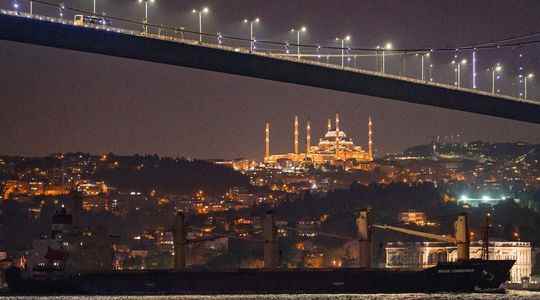Every evening, the streets of the Kadiköy district remain lively until late at night, on the Asian side of Istanbul. To the west of this stronghold of the secular opposition, on the promenade that runs along the Sea of Marmara, one can make out the Princes’ Islands in the distance. The Russian Bolshevik leader Leon Trotsky lived there in exile for several years, after being banished from the USSR by Stalin in 1929. Before him, up to 180,000 White Russians fleeing the revolution had taken up residence in the Turkish megalopolis.
“And a century later, here we are!” jokes Igor Kolchin, 33, exiled in Istanbul since March. The young man has just opened a café close to the port. In the main room of the establishment, customers work frantically on their computers around a large table, while others exchange in Russian. “People also come here to meet compatriots, ask for advice on housing, obtaining residence permits,” explains the owner. Since the announcement, on September 21, of the military mobilization in Russia, it is not uncommon to see young men walk through the door with their wheeled suitcases and look a little haggard.
Igor did not wait for mobilization to leave Russia. “I was traveling abroad at the time of the invasion and I decided not to return, I could not bear to imagine myself living on the side of the aggressor”, says the young man, who sports the many tattoos and the clothing style of the trendy youth of St. Petersburg. Owner of a bar in Vladimir Putin’s home town, he is now looking to sell it.
“Right now, I’m housing seven people in my small apartment”
Like him, many have chosen to leave for Istanbul: flights continue between the two countries and Turkey does not require visas for Russian citizens, who have easy access to a residence permit for one year renewable. “Right now, I’m housing seven people in my small apartment, sometimes when I have no more room at home I sleep in the cafe,” breathes Igor. His older brother joined him two weeks ago, other friends are thinking about taking the road to exile. “Some were waiting for the price of plane tickets, which had reached several thousand euros, to come down, explains the entrepreneur. Others have family or professional imperatives to settle before they can leave.” Once in Istanbul, some of them plan to leave for Europe or Southeast Asia, but others intend to settle there. On the second floor, free Turkish lessons are sold out three times a week.
Oleg, a 29-year-old quality engineer, agreed to be demoted at his company so he could work remotely. He left Russia a week after mobilization. “I was against the war, I even took part in some demonstrations, but I did not have the money to leave and, as the situation was relatively stable, I thought I could continue to live in Russia”, testifies the young man, whose Asian features hint at his belonging to the Udmurt ethnic minority. The mobilization has upset its plans: the call to the flag was to concern “only” 300,000 Russians, selected on criteria of age, military experience, family situation… “It’s a pipe, assures Oleg. They’re rounding up everyone and I was particularly worried because I have a specialization acquired during my military service as a mechanic and driver on the BMP-2 combat vehicle”, a Soviet infantry combat vehicle used massively by the Russian army. His roommate, with whom he shares a small apartment in the neighborhood, had received his mobilization order before escaping.
Newly arrived, Oleg does not yet project himself into the future, but he does not expect a change in mentalities in Russia, nor a fortiori a change in the regime. “My mother, who nevertheless financed my departure, is fiercely pro-Putin, I tried several times to discuss it with her, but it didn’t lead to anything,” he says fatalistically.
Two waves of Russian immigration
Mostly English-speaking, educated and from the middle class, not all exiles share the same motivations. “Those of the first wave, who left the country at the start of the war, were more politicized people, who already had desires to expatriate, knew Istanbul and Turkey, deciphers Emil Herrman, German researcher in anthropology, who made these Russian exiles his subject of study. The people of the second wave, after the mobilization, left in an emergency where they could. They are often less politicized, some even supported the invasion of Ukraine but are not ready to take part in it.”
In Istanbul, the Russian arrivals take advantage of the “balance” policy led by Recep Tayyip Erdogan with Moscow, which condemns the invasion while refusing to join the international sanctions. Turkish banks nevertheless withdrew in September from the alternative payment system Mir, rendering Russian bank cards inoperative on Turkish soil, to the chagrin of exiles.
For its part, the Turkish opposition is indignant at the large presence of refugees of a particular kind: the Russian oligarchs, who have relocated part of their business to Turkey, or who have put their luxury yachts under cover. in the ports of Bodrum or Marmaris. On October 27, from the rostrum of the Assembly, deputy Utku Çakirözer brandished photographs of these boats, warning: “This is not the image of neutrality, but that of the opportunism of corruption and Sanctions [internationales] coming.”
